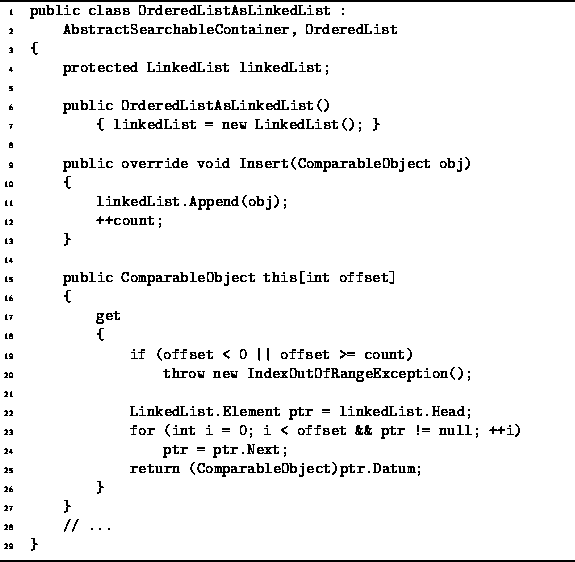|
Data Structures and Algorithms
with Object-Oriented Design Patterns in C# |
Program ![]() gives
the code for the constructor, Insert method,
and this[int] indexer
of the OrderedListAsLinkedList class.
The constructor simply creates an empty linked list.
Clearly, the running time of the constructor is O(1).
gives
the code for the constructor, Insert method,
and this[int] indexer
of the OrderedListAsLinkedList class.
The constructor simply creates an empty linked list.
Clearly, the running time of the constructor is O(1).

Program: OrderedListAsLinkedList class constructor, Insert method, and this[int] indexer.
The Insert method takes a ComparableObject and adds it to the ordered list. As in the case of the ArrayAsLinkedList class, the object is added at the end of the ordered list. This is done simply by calling the Append method from the LinkedList class.
The running time of the Insert method is determined
by that of Append.
In Chapter ![]() this was shown to be O(1).
The only other work done by the Insert method is to
add one to the count variable.
Consequently, the total running time for Insert is O(1).
this was shown to be O(1).
The only other work done by the Insert method is to
add one to the count variable.
Consequently, the total running time for Insert is O(1).
Program ![]() also defines an indexer
that provides a get accessor
which takes an argument of type int.
This method is used to access elements of the ordered list
by their position in the list.
In this case, the position is specified by a non-negative,
integer-valued index.
Since there is no way to access directly
the
also defines an indexer
that provides a get accessor
which takes an argument of type int.
This method is used to access elements of the ordered list
by their position in the list.
In this case, the position is specified by a non-negative,
integer-valued index.
Since there is no way to access directly
the ![]() element of linked list,
the implementation of this method comprises a loop
which traverses the list to find the
element of linked list,
the implementation of this method comprises a loop
which traverses the list to find the ![]() item.
The method returns a reference to the
item.
The method returns a reference to the ![]() item,
provided
item,
provided ![]() .
Otherwise, i is not a valid subscript value
and the method throws an exception.
.
Otherwise, i is not a valid subscript value
and the method throws an exception.
The running time of the accessor method depends
on the number of items in the list
and on the value of the subscript expression.
In the worst case,
the item sought is at the end of the ordered list.
Therefore, the worst-case running time of this algorithm,
assuming the subscript expression is valid,
is O(n), where ![]() .
.